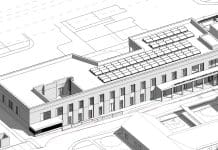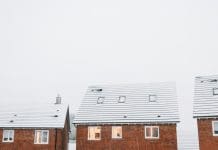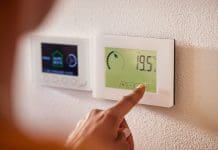The National Retrofit Hub has recently published its guide to Digital Building Logbooks, which use real-time data and personalised insights to support nationwide retrofit and inclusive sustainability
In the face of escalating climate concerns, the urgency to address energy efficiency in buildings has never been more pronounced. The National Retrofit Hub (NRH) emerges as a beacon of hope, actively collaborating and convening the industry to deliver guidance and tools to accelerate the local delivery of retrofit, including their recent guide on Digital Building Logbooks.
Building for wellbeing: The National Retrofit Hub’s path to net zero
At the heart of the NRH’s strategy lies a commitment to ensuring that existing buildings meet the environmental, financial, health and wellbeing needs of all people while contributing to net zero targets.
Energy-inefficient homes have far-reaching consequences, inflicting a substantial toll on both our healthcare system and human lives. The Building Research Establishment (BRE) estimates that it costs the NHS £1.4bn a year to treat people affected by poor housing.
The NRH is driving action towards buildings that promote physical, mental and social wellbeing. By prioritising occupant comfort, indoor air quality, and access to green spaces, the NRH aims to support the industry in creating living environments that nurture and uplift communities while decarbonising our homes.
To achieve its ambitious goals, the NRH has established six working groups, each dedicated to driving forward specific aspects of its agenda.
Here, we take a look at just one of the workstreams from one of its working groups, showcasing the opportunity for Digital Building Logbooks and Retrofit Plans for every home to enable good quality retrofit at scale.

Enabling infrastructure: Digital Building Logbooks and retrofit plans
Digital Building Logbooks have the potential to offer a comprehensive repository of information for homes or buildings, including details on construction materials, element conditions, installation timelines and retrofit plans derived from various data sources and surveys.
They could also incorporate real-time usage data from smart meters and facilitate connections to funding and incentives.
Logbooks represent a paradigm shift in how we approach retrofit projects. By documenting key metrics such as energy consumption, carbon emissions and performance indicators, logbooks provide invaluable insights into the efficacy of retrofit interventions.
Moreover, they serve as a dynamic tool for monitoring progress over time, facilitating data-driven decision-making and continuous improvement.
In tandem with logbooks, retrofit plans offer a tailored roadmap for enhancing the energy efficiency of individual homes. Leveraging a multidisciplinary approach encompassing building science, engineering and sustainability principles, these plans provide targeted and potentially phased interventions to address the unique needs and challenges of each property.
From repair and maintenance, insulation upgrades and improved ventilation to renewable energy integration, retrofit plans serve as blueprints for realising tangible energy savings, improved building performance and environmental benefits.
Holistic understanding of building condition and performance
Digital Building Logbooks will sit alongside and complement Energy Performance Certificates (EPCs), offering a more holistic understanding of a building’s condition and performance.
The adoption of property logbooks across the UK would give policymakers, local authorities and delivery organisations clear visibility of overall demand for certain measures. This could enable collective approaches for projects, increasing efficiency and reducing cost.
Procurement routes that share value with residents through performance or social benefit contracting could also be enabled with the in-use data portion of the property logbook.
Transforming the retrofit industry in a more data-driven and resident-focused direction would allow us to exponentially scale the pace of delivery. A bespoke plan for every home could be created, using a mix of automated, verified and surveyed data, managing risk to prevent unintended consequences, while allowing the production of information at scale.
The National Retrofit Hub is convening professionals on this topic, and many more. Through its six working groups, it is working to improve the pieces of the retrofit puzzle identified within the National Retrofit Strategy. NRH Working Group 1: Warm Healthy, Net Zero looks at how the right packages of measures can be identified for each home to meet national targets while avoiding unintended consequences, ensuring quality and enabling scale-up.
Part of this group is working in collaboration with the RLBA and founders of Novoville to explore property logbooks as a tool for retrofit, engaging with the Green Finance Institute, Trustmark and many others.
NRH launches guide to building logbooks
The NRH has recently launched a guide to Digital Building Logbooks to support nationwide retrofit initiatives.
NRH co-director Rachael Owens highlights the transformative potential of these logbooks in streamlining access to building data, enabling better resident engagement and decision-making.
Supported by a matrix showcasing UK building data, compiled by NRH Working Group 1 technical lead Louis Daillencourt, the initiative aims to standardise data schemas and enhance accessibility.
Collaboration with stakeholders and organisations like the Green Finance Institute (GFI) and Residential Logbook Association (RLBA) is key in driving widespread adoption and addressing ethical and ownership implications.
Empowering homeowners: A path to inclusive sustainability
Beyond their role as monitoring tools, logbooks serve as powerful instruments for empowering homeowners to actively participate in the retrofitting process.
By providing access to real-time data and personalised insights, logbooks would enable homeowners to make informed decisions about energy usage, maintenance and upgrades.
Moreover, by promoting transparency and accountability, logbooks help bridge the gap between homeowners, contractors and policymakers, fostering a culture of collaboration and shared responsibility.
The National Retrofit Hub’s vision for enabling the local delivery of retrofit at scale is both bold and transformative, guided by a strategy rooted in equity, efficiency and resilience.
By championing initiatives such as logbooks, the NRH is paving the way towards a future where every home embodies wellbeing, sustainability and resilience.
National Retrofit Hub
www.nationalretrofithub.org.uk
X
LinkedIn
Instagram















